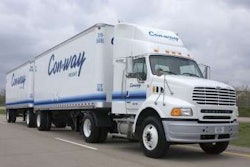J.B. Hunt Transport Services Inc. on Monday, April 13, announced first-quarter 2009 net earnings of $30.8 million compared to $36.4 million during the year-ago period. Total operating revenue was $723 million, an 18 percent decrease from $878 million.
The company said the decrease in operating revenue was attributable primarily to lower fuel surcharge revenues that reflect significantly lower fuel costs in the first quarter of 2009. Higher Intermodal segment volumes and significant growth in the company’s Integrated Capacity Solutions (ICS) segment partially offset lower volumes in its Dedicated Contract Services (DCS) segment and its Truck segment. The significant decline in Truck revenues was primarily a result of the company’s ongoing long-term strategy to reduce the size of the segment’s tractor fleet and weaker demand brought about by the current economic recession. Operating revenue, excluding fuel surcharges, decreased 8 percent.
Operating income declined to $57.0 million vs. $72.1 million, which the company said was due primarily to a drop in its Intermodal operating income and an operating loss in its Truck segment. The operating income decline in both segments reflects lower demand brought about by the current economic recession. Net earnings declined due to the lower operating income, offset somewhat by significantly lower interest expense and a slightly lower effective income tax rate. Net interest expense declined about $4.8 million, primarily due to the reduction of outstanding debt and lower interest rates.
“Our two biggest segments, Intermodal and DCS, which make up 79 percent of our total revenues, continue to differentiate us from other generic transportation offerings,” said Kirk Thompson, president and chief executive officer of Lowell, Ark.-based J.B. Hunt. “Despite a weak economy and lower demand, both Intermodal and DCS have shown great resilience in profitability in the face of serious negative macroeconomic conditions.”
Thompson said the lingering freight recession, now estimated to be in the third year, is the longest and deepest in modern transportation history. “Our diversification strategy initiated several years ago and our best-in-class intermodal and dedicated services have helped sustain our earnings in these turbulent times,” he said. “We believe we have taken the right actions to weather this downturn, while leaving the company very well positioned for the eventual recovery. Intermodal and DCS, in particular, are leaders in markets where we have established defensible characteristics. Further, ICS enables us to bring the substantial resources of our company into markets that previously did not fit our network.”











